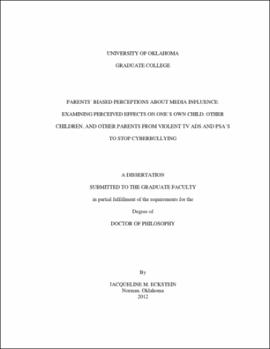| dc.contributor.advisor | Meirick, Patrick C. | |
| dc.creator | Eckstein, Jacqueline M. Eckstein M. | |
| dc.date.accessioned | 2019-04-27T21:26:14Z | |
| dc.date.available | 2019-04-27T21:26:14Z | |
| dc.date.issued | 2012 | |
| dc.identifier | 99190342202042 | |
| dc.identifier.uri | https://hdl.handle.net/11244/318688 | |
| dc.description.abstract | This study found within a large, demographically diverse sample of American parents evidence of a parental third-person effect and a parental first-person effect. This was regardless of whether the respondent was a mother or father. Parents' perceptions of influence seem to be a function of their perception of the child's likely exposure to the message. A belief that the child was predisposed toward physical aggression was important in producing influence judgments from violent TV ads. A belief that the child was predisposed toward the teasing behavior was more important than perceived exposure in producing influence judgments about the PSAs to stop cyber-bullying. Parents were willing to monitor their child's TV viewing and expand dissemination of the PSAs based on these influences biases. | |
| dc.format.extent | 153 pages | |
| dc.format.medium | application.pdf | |
| dc.language | en_US | |
| dc.relation.requires | Adobe Acrobat Reader | |
| dc.subject | Mass media--Social aspects | |
| dc.subject | Mass media--Psychological aspects | |
| dc.subject | Mass media and children--United States | |
| dc.subject | Mass media and families--United States | |
| dc.subject | Cyberbullying | |
| dc.title | Parents' Biased Perceptions About Media Influence: Examining Perceived Effects on One's Own Child, Other Children, And Other Parents From Violent Tv Ads And Psa's To Stop Cyberbullying | |
| dc.type | text | |
| dc.type | document | |
| dc.thesis.degree | Ph.D. | |
| ou.group | College of Arts and Sciences::Department of Communication | |
